
Logging is the process of cutting, processing, and moving trees to a location for transport. It may include skidding, on-site processing, and loading of trees or logs onto trucks or skeleton cars. In forestry, the term logging is sometimes used narrowly to describe the logistics of moving wood from the stump to somewhere outside the forest, usually a sawmill or a lumber yard. In common usage, however, the term may cover a range of forestry or silviculture activities.

Forest gardening is a low-maintenance, sustainable, plant-based food production and agroforestry system based on woodland ecosystems, incorporating fruit and nut trees, shrubs, herbs, vines and perennial vegetables which have yields directly useful to humans. Making use of companion planting, these can be intermixed to grow in a succession of layers to build a woodland habitat. Forest gardening is a prehistoric method of securing food in tropical areas. In the 1980s, Robert Hart coined the term "forest gardening" after adapting the principles and applying them to temperate climates.
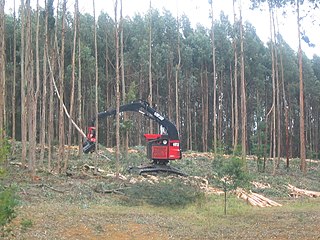
Pulpwood is timber with the principal use of making wood pulp for paper production.
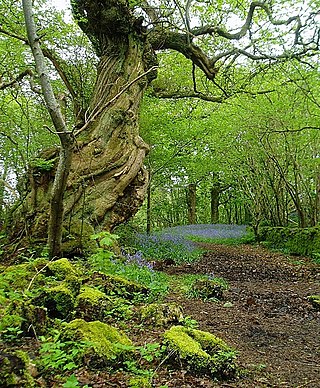
In the United Kingdom, an ancient woodland is a woodland that has existed continuously since 1600 or before in England, Wales and Northern Ireland. Planting of woodland was uncommon before those dates, so a wood present in 1600 is likely to have developed naturally.

Certified wood and paper products come from responsibly managed forests – as defined by a particular standard. With third-party forest certification, an independent standards setting organization (SSO) develops standards for good forest management, and independent auditing companies issue certificates to forest operations that comply with those standards.
This article is the index of forestry topics.
The following outline is provided as an overview of and guide to forestry:
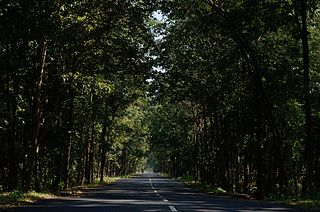
Social forestry is the management and protection of forests and afforestation of barren and deforested lands with the purpose of helping environmental, social and rural development. The term social forestry was first used in 1976 by The National Commission on Agriculture, when the government of India aimed to reduce pressure on forests by planting trees on all unused and fallow lands. It was intended as a democratic approach to forest conservation and usage, maximizing land utilization for multiple purposes.

Woodchipping is the act and industry of chipping wood for pulp. Timber is converted to woodchips and sold, primarily, for paper manufacture. In Australia, woodchips are produced by clearcutting or thinning of native forests or plantations. In other parts of the world, forestry practices such as short rotation coppice are the usual methods adopted.

The Sustainable Forestry Initiative (SFI) is a sustainability organization operating in the U.S. and Canada that works across four pillars: standards, conservation, community, and education. The SFI was founded in 1994 by the American Forest & Paper Association (AF&PA). SFI is the world's largest single forest certification standard by area. SFI is headquartered in Ottawa and Washington, D.C.
Rubberwood is a light-colored medium-density tropical hardwood obtained from the Pará rubber tree, usually from trees grown in rubber plantations. Rubberwood is commonly advertised as an "environmentally friendly" wood, as it makes use of plantation trees that have already served a useful function.
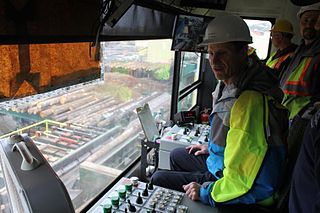
Collins is a family-owned American forest products company that began in operations July 28, 1855. Headquartered in Portland, Oregon, Collins was the first privately owned forest products company in the United States to have all of its hardwood and softwood forests certified by the Forest Stewardship Council (FSC). In addition to its forests and sawmills, Collins also manufactures siding and trim, particleboard, hardwood, and softwood lumber, and operates retail hardware and lumber yards in northern California. Divisions include: Collins Pine Company, Kane Hardwood, Collins Hardwood LLC, Collins Products LLC, Collins Builders Supply, and the Almanor Railroad.

Forestry in India is a significant rural industry and a major environmental resource. India is one of the ten most forest-rich countries of the world. Together, India and 9 other countries account for 67 percent of the total forest area of the world. India's forest cover grew at 0.20% annually over 1990–2000, and has grown at the rate of 0.7% per year over 2000–2010, after decades where forest degradation was a matter of serious concern.

Belt Woods is a nature reserve in Prince George's County, Maryland, U.S., containing the "South Woods", a 43-acre (170,000 m2) woodland which constitutes one of the last stands of old growth hardwood forest on the Atlantic coastal plain. It is a mere 8 miles (13 km) east of Washington, D.C. Many of its white oaks and tulip poplars are more than three feet in diameter and soar more than 100 feet (30 m) before branching. The "South Woods" were designated a National Natural Landmark in 1974.
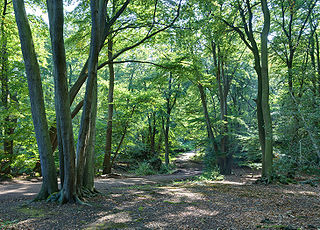
The United Kingdom, being in the British Isles, is ideal for tree growth, thanks to its mild winters, plentiful rainfall, fertile soil and hill-sheltered topography. Growth rates for broadleaved (hardwood) trees exceed those of mainland Europe, while conifer (softwood) growth rates are three times those of Sweden and five times those of Finland. In the absence of people, much of Great Britain would be covered with mature oaks, except for Scotland. Although conditions for forestry are good, trees do face damage threats arising from fungi, parasites and pests. The development of afforestation and the production and supply of timber in Wales come under Natural Resources Wales, as set out in the Forestry Act 1967.

Forestry in New Zealand has a history starting with European settlement in the 19th century and is now an industry worth seven percent of annual revenue. Much of the original native forest cover was burnt off and logged, however forests have been extensively planted, predominantly with fast-growing cultivars of the Monterey Pine. Wood chips, whole logs, lumber and paper products are exported from New Zealand.
The wood industry or timber industry is the industry concerned with forestry, logging, timber trade, and the production of primary forest products and wood products and secondary products like wood pulp for the pulp and paper industry. Some of the largest producers are also among the biggest owners of timberland. The wood industry has historically been and continues to be an important sector in many economies.
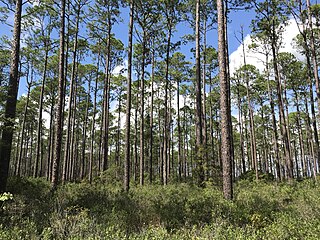
Dixon Memorial State Forest is a state forest in Brantley and Ware counties, located 10 miles southeast of Waycross, Georgia bordered by the Okefenokee National Wildlife Refuge to the south. The forest is approximately 35,000 acres and is the largest state forest owned and managed by the Georgia Forestry Commission. The forest is mostly made up of pine plantations consisting of slash pine, longleaf pine, and loblolly pine as well as wetlands consisting of pondcypress, swamp blackgum, sweetbay magnolia, loblolly bay, and other various hardwoods.
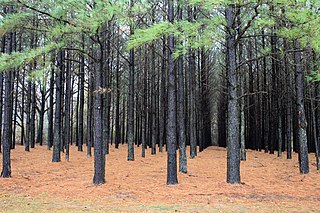
A tree plantation, forest plantation, plantation forest, timber plantation or tree farm is a forest planted for high volume production of wood, usually by planting one type of tree as a monoculture forest. The term tree farm also is used to refer to tree nurseries and Christmas tree farms.